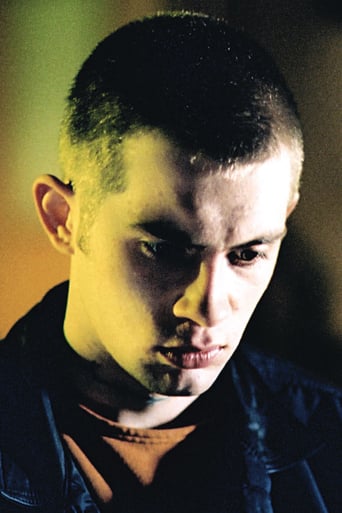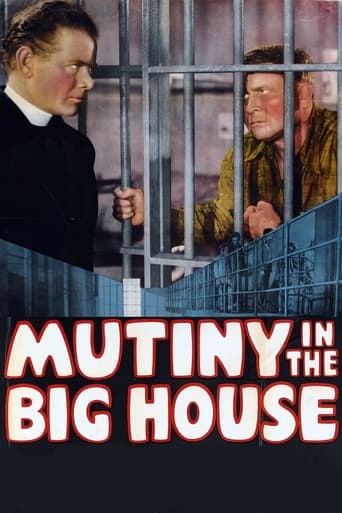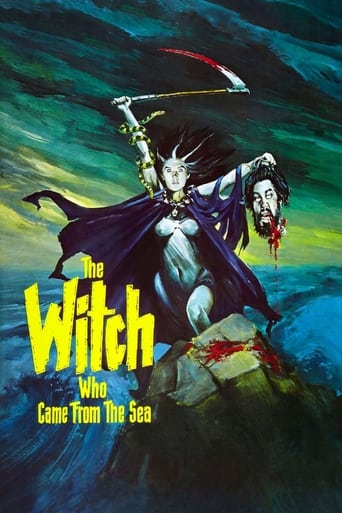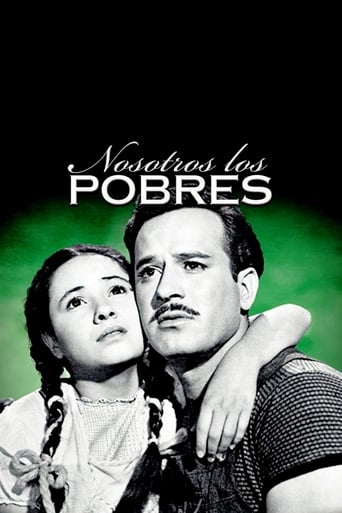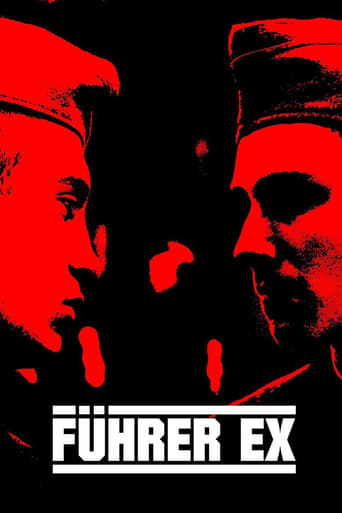
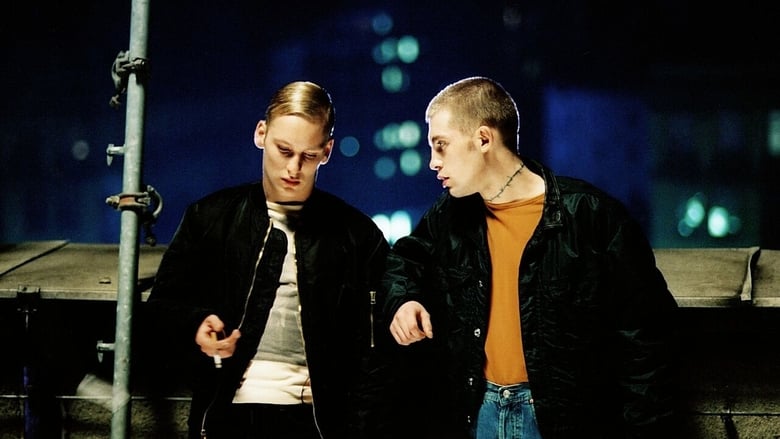
Führer Ex (2002)
Ingo Hasselbach, whose parents were Communist Party members in East Germany during his childhood, has lived at both ends of the political seesaw. The question of how people reach a change of heart is a profound one; Hasselbach describes the external forces that led to his founding Germany's first neo-Nazi political party and the internal ones that led him away from it five years later.
Watch Trailer
Cast
Similar titles
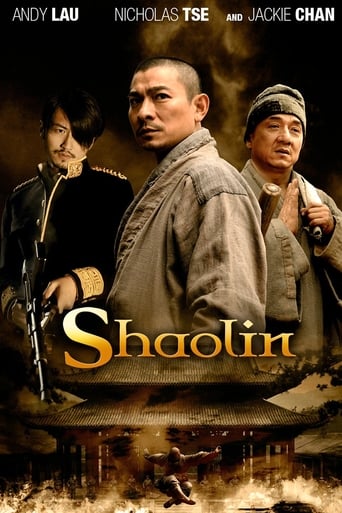
Reviews
Undescribable Perfection
Good films always raise compelling questions, whether the format is fiction or documentary fact.
Exactly the movie you think it is, but not the movie you want it to be.
There are moments in this movie where the great movie it could've been peek out... They're fleeting, here, but they're worth savoring, and they happen often enough to make it worth your while.
"Führer Ex" is certainly as baity as it gets and I guess they had success with that as this fairly mediocre movie is a lot more known than it really should be. Director here is Winfried Bonengel and he also adapted Ingo Hasselbach's autobiographic work for the screen. Still I think there is a reason why nobody from the cast really (with one exception, I come to that later) is in famous fames these days anymore and same also goes for Bonengel who went on to direct terrible television series after this project and none of the works he made before or after this one comes close to this one in terms of popularity.The movie runs for 100 minutes and tells us about the lives of 2 GDR citizens who are sick of their country and try to flee. However, instead of becoming respectable FRG citizens, they switch to the other side and end up on the far right. Most of the movie is about depicting what happens when they were in jail. Easily the best thing about this film is Dieter Laser, he is the one I was referring to previously as he is still well-known today. He plays a prison inmate who killed his wife and talks all about self-defense, but it becomes so obvious that this is not what happened. That scene, as brutal as it was, was also pretty hilarious because of Laser's insane line delivery. Sadly, the rest of the film is almost in its entirety forgettable and there are very few memorable moments. Even the ending does not feel authentic, but just dramatic for the sake of it. I do not recommend this film.
Apart from a few disappointing aspects, I really enjoyed the movie. I think the two main actors did an excellent job. Aaron Hildebrand (as Tommy) started out as a daredevil kind of bad guy, awed by his friend Heiko, and he kept up this attitude throughout the whole movie. It's only when the circumstances around him change for the worse, especially in the last part of the movie when he's confronted with the Neo-Nazi's who want to tow him in, that we see how, in comparison with the others, he has in fact the better character: maybe a bit streetwise, but with both feet firmly on the ground, and loyal to his friend. Hildebrand definitely has charisma and a very easy and natural way of acting.Christian Blümel (Heiko) was very convincing too as the susceptible youngster who looses his innocence by brutal force. He's really a very promising actor, see for instance the scene where he is visited in prison by the girl he loves, he's just so moving in his bewilderment and happiness and shame all at the same time! But he especially deserves high credits for his performance during the crucial scene with the sexual assault in the showers (in uncompromising full frontal nudity!), he succeeded in making the emotional impact very believable, totally overwhelmed, not being able to counter-act and at last physically and psychologically devastated. And later on in the movie Blümel's portrayal of the slickly groomed Neo-Nazi, shouting his speech with a distorted face to a Sieg Heil-yelling mob was very blood-chilling. On the other side there were several things amiss in this movie. For instance: to me the transition of Heiko was too abrupt. He's jolted into the isolation-cell as someone who loathes the Nazi's, but when he at last stumbles out we see him shake hands with the local Nazi-leader, and in the next scene (several years later) we suddenly see him as a Neo-Nazi-leader of his own. We don't get to witness any gradually change to make this understandable. Or are we supposed to believe that being locked up for who knows how long turns you so insane that you end up being a Nazi?The guards in this fierce communistic prison all seemed a bit puffy and aging, as were most of the inmates, who hardly seemed a realistic physical threat to an athletic boy of twenty-something. And the escape from prison by Tommy lacked any realism whatsoever: it's totally unbelievable to me that an inmate in such a notorious and supposedly well-guarded prison can just hop into a crate (in broad daylight and among a crowd of co-workers and guards) and let himself be carried out into freedom. Weren't they supposed to check outgoing vans with dogs or something?? And then I was also a bit disappointed in the ending: after the touching scene on the roof (Tommy dying in the arms of Heiko) we abruptly change to Heiko (some undefined time later) walking briskly and with a serious face through a sunny street in an (undefined) place. That's it: the end. So what are we supposed to conclude? Did he come to his senses after Tommy's death? The fact that his hair wasn't slick anymore possibly refers to that. But then how did he escape his fierce Nazi-friends?? Or did he maybe run of to Australia (Tommy brought him the tickets right before he died). Maybe that's exactly what the director wants us to do, to brood over this, but to me this last scene doesn't work, it doesn't add up to anything, it's just confusing. If anything, I would have preferred an ending with the scene on the roof, Heiko like a Romeo with his dead Juliette, crying out his despair and anger to heaven. All considered, the positive predominates: an emotionally involving and well acted movie.
This may be an unfair comparison, but take the elements of male friendships and self- discovery from Trainspotting and add the pacing, violence, frustrations, and relationships from Romper Stomper, and you'll get a feel for what this excellent film is like visually and sensually. A worthy round of applause to Director Bonengel and Actors Blumel and Hildebrandt and crew. Especially noteworthy, from an American perspective, is how powerfully and unapologetically the frontal nudity scenes were done in the prison. (American directors and film stars are cowards in comparison when addressing themes of such violence, sexuality, pain and need.) The directing, filming, lighting, acting and editing perfectly highlight the powerful aggressiveness and absolute vulnerability of the characters in a way that does not betray the craftsmanship that went into the production. Kudos to the entire team of Fuhrer Ex. The film is emotionally charged: uncomfortable, painful, tender, funny, and exciting. Highly-recommended.
***SPOILERS*** ***SPOILERS*** Führer Ex is an impressive work about the rise of Neonazism in Eastern Germany and a precise portrait of a society where this could happen. Its a possible eye-opener especially for a younger audience, realisticly depicting violence in prison and by neonazi-groups against leftist "Rats" and foreigners. It strongly draws its realism from the real life of co-writer Ingo Hasselbach, who in the early 90s was head of an notorious Neonazi-faction that spread fear and violence in parts of East-Berlin. Later and with the help of director Winfried Bonengel he found his way out and cofounded the EXIT-program for former extremists.Mainly focusing on the friendship of two buddys Heiko and Tommy growing up in East-Berlin in the late 1980s, it shows two punkish rebels with dreams about going to capitalist Australia, "because there you are completely free and can do what you like". Maybe this illusion just comes from seeing all the same faces everywhere, or going to the same bar everynight. At first it's just minor offences like peeing on the "official" GDR-newspaper, then burning the flag, in the end they try to flee and climb over the wall. But they are caught and put into prison. This is where the film finds its center: Faschist gangs and Skinheads are ruling the prisons in East-Germany even under Communist rule. The regime breeds its enemies while it officially preaches its anti-faschist stance regularly as being the fundation and reason for the state. But in prison being nazi is the most extreme way to protest against the ruling ideology of socialist brotherhood.The two buddies at first choose different ways to survive the brutality in prison: Tommy finds refuge by joining the right-wing group on the block while Heiko tries to walk alone - until he is raped in the bathroom by another inmate. He than joins hands with Faschist-leader Friedhelm who feeds his followers with old-time Nazi-ideology. Tommy is able to flee to the West. But when he returns to Berlin a couple of months later after the fall of the wall he finds his friend hardend and as being the leader of the pack, holding speaches, wearing brown uniform-shirts and setting fire to a food-stall because the owner is Turkish. After the death of young girl in a street fight, Tommy turns away from the faschist-group. And a dramatical final even Heiko finds a way out.Its a raw and energetic direct movie with minor weaknesses in character-drawing and when it comes to finding a deeper explanation for the turnaround of the two buddies. Nevertheless its a movie that was highly necessary. The message to East-Germany might still be a shock for some people: That faschism and neonazism, racism and intolerance is not an import from the West but was lingering in the underground of their own GDR. P.S. String-parts of the soundtrack are often highly irritating.

